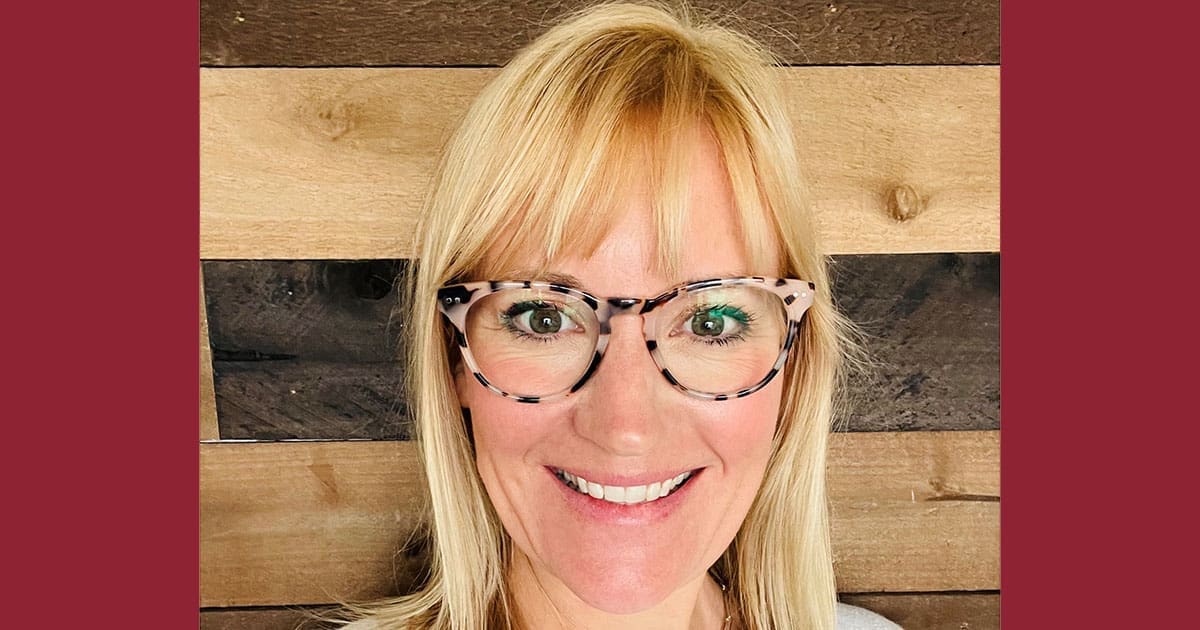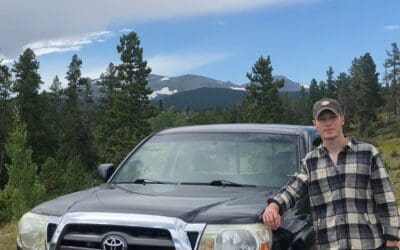As an undergraduate student, Kate Wilson enrolled in two life-changing educational programs that not only inspired her to switch majors from Anthropology to Environmental Policy, but ultimately led the New Jerseyan to pursue a master’s degree at University College, land a high-profile position at Fortune 500 company Vail Resorts, and become a recipient of Denver Business Journal’s prestigious “40 Under 40” award.
The change of heart began during Wilson’s junior year at Colby College when she embarked on a semester abroad in Kenya and Tanzania. The experience, she says, opened her eyes to the “uglier side of westernization and overconsumption.” Living with hunter-gatherer communities in huts, she saw a civilization that was “happy and sustainably living off the land,” yet forced into development and modernization.
The following summer, Wilson enrolled in a Colorado-based lab course—a Wyoming-to-Mexico backpacking excursion to study ecosystems along the Colorado River. Meeting with a “diverse set of stakeholders” along the way, she also learned how water laws in the West affect people’s livelihoods and food systems.
The two experiences influenced how Wilson came to view sustainability, including the realization that “the people most impacted are the most vulnerable,” and, perhaps most significantly, they inspired Wilson’s life mission:
“I decided my calling was to make the biggest impact mitigating climate change that I could in my life.”
“It all comes down to DEI [Diversity, Equality, Inclusion] for me,” says Wilson, senior director of sustainability at Vail Resorts. “How do we make sure that when we’re thinking about environmental preservation and conservation and systems that we are doing so in an inclusionary way? How can we live sustainably in these landscapes and protect the wildlife and cultures?”
Bold Action
Wilson returned to Colorado shortly after college to sell Renewable Energy Credits (RECs) for a Boulder start-up, and soon thereafter enrolled in the Environmental Policy and Management (EPM) program at University College—”to deepen my knowledge of the environmental field to open up more career options.”
A few online classes later, Wilson quit her job to study full time, finishing her master’s degree in two years. She fondly recalls the process of working on her capstone, which essentially created a best-practices template for writing a climate action plan for a city; the guidance and encouragement provided by her “amazing” capstone advisor, Ken Knox (who no longer teaches at DU); and another impactful river field trip to study stream health.
“All of that validated my undergrad experience. I knew that I wanted to work in the climate field, but I didn’t know exactly where I wanted to contribute yet.”
The opportunity to gather more skills, the positive capstone experience, and the confidence of having a master’s degree were all influential in focusing, and furthering, Wilson’s career. Plus, the skills and knowledge learned in the program were adaptable, she notes, so even though her capstone focused on the public sector, a city, she was able to apply them to her work with companies in the private sector.
Before landing at Vail Resorts, Wilson spent a year in GreenCorps’ field school for environmental organizing, then worked in climate consulting in DC for a year, then spent 10 years—the last as principal—at consulting firm The Cadmus Group, where she worked with Fortune 500 companies to develop sustainability strategies aligned with their culture and goals. (She also had the opportunity to work behind the scenes on former President Obama’s Clean Power Plan, since Cadmus won the first paid work on the project.)
With nearly 20 years in the environmental sector, Wilson has experienced not only technological changes in the field but also changes in attitude.
“In the beginning, it was convincing companies … that climate change was a real threat, and something they should work to mitigate and build resilience around,” she says. “Now, the biggest challenge is the time that’s needed for bold action to make a difference.”
To Wilson, bold action comes in the form of ambitious and innovative goal setting.
“I always talk about the idea that in order to mitigate climate change, we need to set goals that are so big that we don’t know initially how we’ll reach them.” It’s common for companies to set sustainability goals they think they can reach, she says, but in reality they’re not tied to climate change. “They don’t do enough.”
At Vail Resorts, they set the goal first, she explains, then work to figure out what it will take to meet it.
“That’s the level I want to play at. Let’s not take baby steps and then be surprised we didn’t get the result. Don’t be afraid you don’t know the steps when you start, or worry it is the right path. It is the right path.”
Key to meeting the challenges, she adds, is “a lot of collaborative effort.”
Collaboration is a major component of her success at Vail Resorts where she runs the company’s “Commitment to Zero” program, an ambitious sustainability commitment initiated in 2017 to meet a zero-net impact by 2030 across all of the company’s 37 resorts in 15 states and three countries (the U.S., Canada, and Australia).
Wilson is proud to share some of Vail Resorts’ significant Commitment to Zero milestones through its EpicPromise Progress Report, including “great strides in reaching our 100 percent renewable electricity goal” through partnerships with Elektron Solar Project, a local Utah-based solar farm, and energy company Orsted to enable the Plum Creek Wind project, a large scale wind farm in northeast Nebraska. The two initiatives will enable Vail Resorts to be 93 percent powered by renewable electricity by 2023.
The company already reached a sub-goal to reach 50 percent waste diversion from landfill for 16 of its resorts in March 2020, nearly a year ahead of schedule. One example of how they avoid landfills is through a partnership with Helly Hansen, its official uniform provider, as they soon begin upcycling old uniforms into tote bags and backpacks, among other items.
Solving problems brought on by current issues, such as the coronavirus pandemic, has also driven collaboration. For example, single-use wrappers have become a problem at ski resorts due to the current “grab and go” food-safety culture, Wilson notes. A partnership with PepsiCo allows for the collection, sorting, and recycling of food wrappers. Examples of end products are Adirondack chairs and a terrain park feature at Vail’s Breckenridge resort.
“It’s [those] types of things we wouldn’t have done if we weren’t pushing,” Wilson says, while emphasizing the importance of an organizational culture where all employees, from the top down, contribute and collaborate. The company’s “Know Before You Throw” campaign is practiced at all Vail’s resorts, even ski lesson staff who teach kids to compost food and put wrappers in the recycling bucket.
“Whether it’s working with Rob Katz, our CEO, to enable a wind farm to come online, which we did, or sort wrappers,” Wilson says it all comes down to figuring out how to make an impact at all levels.
She also sees Vail’s commitment to sustainability as an impetus to attracting and retaining talented people who want to put their passions and values to work. “People want to work towards something bigger than themselves.”
40 Under 40
Last year, as one of Denver Business Journal’s “40 Under 40,” an award that celebrates significant professional and community contributions of 40 leaders under 40 years old, Wilson was formally recognized for her leadership in sustainability and the contributions she’s made within the ski industry and across the Denver community.
“I was surprised and very honored,” Wilson says. “That award is meaningful to me because it recognizes the incredible efforts of the sustainability team and really all employees across Vail Resorts who make Commitment to Zero come to life every day.”
Although Wilson dreams big, she’s also a realist, acknowledging that not every company has the resources that Vail Resorts has, including a sustainability team of 12 like she has. Yet, she maintains that it’s still possible for any organization to make a difference.
“It’s going to look different for each company,” she says. “How can we make a difference with what we have to work with? How can we improve next time? It all comes back to bold goal setting and innovation.”
Attitudes and Inspiration
Wilson has been gratified to see that attitudes about climate change are finally evolving. She recalls cold calling companies in the beginning of her career, trying to “convince them that climate change was a ‘thing’ and they should hire me to help them fix it.”
“Twenty years later, people are realizing it’s a serious problem.”
Also evolving is the noticeable gender gap that Wilson witnessed early in her career. She recalls attending conferences and “feeling like it was an entire room of white males.” At one particular conference where she was a speaker, a man asked her if she was someone’s secretary.
“No, I’m a panelist,” Wilson recalls replying bluntly.
“You keep going, you get used to it, [even though] there you are, the one up there on stage.”
Wilson has long looked to two groundbreaking female conservationists for inspiration, Gina McCarthy and Jane Goodall, both of whom she has had the good fortune to meet.
She has met McCarthy twice, in fact, both times at Climate Leadership Conferences which took place before McCarthy was named the first White House National Climate Advisor by President Biden, an appointment that Wilson wholeheartedly approves of.
Wilson met Goodall just last year at a Mountain Towns 2030 conference where they both were speaking about climate change. During a break, Wilson introduced herself to Goodall and asked the legendary scientist how she manages to stay hopeful when she sees so many hard things in the world.
“We can’t not keep going,” replied Goodall, undoubtedly confirming a conviction held by Wilson herself.
Indeed, Wilson understands the significance of having role models, especially a young woman navigating a career.
In 2015, she became a member and mentor at the University of Colorado Leeds Women’s Leadership Council. “It was important to me to help others have an easier path, and to bring new perspectives and voices into the arena to drive innovation and change.”
She remembers attending a conference hosted by the Council, called “The WILD (Women Inspiring Leadership Development).
“It was my first experience … of going into a room with 600 women in suits,” she recalls. “I could have just walked into the room and turned around and left. What an experience to be in a room with mostly women in a business environment.”
Wilson also sits on the executive board of Resource Central, a conservation nonprofit based in Boulder that helps to reduce water and energy use across Colorado and beyond. She joined the board in January 2020, she says, “because I loved the organization’s mission and I wanted to roll up my sleeves in my own community and reduce my own footprint.”
This summer she will be implementing a component of the organization’s “Save Water” program when her family replaces part of their lawn with a Colorado native xeriscaped “Garden in a Box” from Resource Central.
It’s apparent that Wilson’s mantra of “bold goal setting and innovation” carries over into her personal life.
Like many parents during the pandemic, she and husband Nick Wilson, who runs Twisted Pine Brewing Co. in Boulder, were perplexed about how to handle at-home schooling. But, she says, once her “entrepreneurial spirit” kicked into gear, she and a fellow mom with kids the same age (6 and 4) devised a plan to create their own (unofficial) school. She created a spreadsheet of COVID-related rules, sent ads out to a few families in the same predicament, and found six families who wanted “in.”
The result: Since August, a mini-school that rotates between her and another family’s reconfigured basements has been occupied by nine kids and a district teacher-turned-tutor who helps them log in to their public school curriculum and complete assignments.
“It has taught me a lot about building community and how amazing teachers are,” Wilson says, while emphasizing “the privilege of being able to work from home this year, understanding so many cannot.”
Wilson feels fortunate to have been nurtured by parents who ensured that she and her two brothers were both culturally and environmentally aware. Her father, Tom Swayne, was one of the first people to hike the Pacific Crest Trail, she says, and her mother, Susie Swayne, was active in Outward Bound, a longtime provider of experiential and outdoor education programs. From age seven to 15, she and her family lived in London and often visited nearby countries where she discovered “a richness to culture, tradition, and language.” After London, the family returned to New Jersey, but no matter where they lived, family outings were primarily outdoor experiences, including skiing, hiking, and summers spent in the Adirondack Mountains.
“Nature has always been a powerful influence in my life,” Wilson says. “I’ve always had this vision, especially now as a mother, that these places need to be protected. They were here long before us and will be here long after us. It’s much different than a career,” she adds. “It’s innately in me to take care of these amazing places.”




